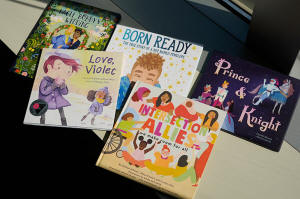Supreme Court signals support for Maryland parents who object to LGBTQ
books in public schools
[April 23, 2025]
By MARK SHERMAN
WASHINGTON (AP) — The Supreme Court's conservative majority on Tuesday
signaled support for the religious rights of parents in Maryland who
want to remove their children from elementary school classes using
storybooks with LGBTQ characters.
The court seemed likely to find that the Montgomery County school
system, in suburban Washington, could not require elementary school
children to sit through lessons involving the books if parents expressed
religious objections to the material.
The case is one of three religious rights cases at the court this term.
The justices have repeatedly endorsed claims of religious discrimination
in recent years.
The school district introduced the storybooks in 2022, with such titles
as “Prince and Knight” and “Uncle Bobby’s Wedding,” as part of an effort
to better reflect the district’s diversity.
Parents initially were allowed to opt their children out of the lessons
for religious and other reasons, but the school board reversed course a
year later, prompting protests and eventually a lawsuit.
The case hit unusually close to home, as three justices live in the
county, though none sent their children to public schools.
“I guess I am a bit mystified as a lifelong resident of the county how
it came to this,” Justice Brett Kavanaugh said. Kavanaugh also expressed
surprise that the school system was "not respecting religious liberty,”
especially because of the county’s diverse population and Maryland’s
history as a haven for Catholics.
Pressed repeatedly about why the school system couldn't reinstitute an
opt-out policy, lawyer Alan Schoenfeld said, “It tried that. It failed.
It was not able to accommodate the number of opt-outs at issue.”

Sex education is the only area of instruction in Montgomery schools that
students can be excused from, Schoenfeld said.
Justices referred to several of the books, but none as extensively as
“Uncle Bobby's Wedding,” in which a niece worries that her uncle will
not have as much time for her after he gets married to another man.
[to top of second column]
|

A selection of books featuring LGBTQ characters that are part of a
Supreme Court case are pictured, Tuesday, April, 15, 2025, in
Washington. (AP Photo/Pablo Martinez Monsivais)

Liberal Justice Sonia Sotomayor and conservative Justice Samuel
Alito, who are on opposite sides of most culture-war clashes,
offered competing interpretations.
“Is looking at two men getting married, is that the religious
objection?" Sotomayor said, noting there's not even any kissing
involved.
Alito described the book as an endorsement of same-sex marriage.
“The book has a clear message, and a lot of people think it’s a good
message, and maybe it is a good message, but it’s a message that a
lot of people who hold on to traditional religious beliefs don’t
agree with,” he said.
In all, five books are at issue in the high court case, touching on
the same themes found in classic stories that include Snow White,
Cinderella and Peter Pan, the school system's lawyers wrote.
In “Prince and Knight,” two men fall in love after they rescue the
kingdom, and each other. “Love, Violet” deals with a girl’s anxiety
about giving a valentine to another girl. “Born Ready” is the story
of a transgender boy’s decision to share his gender identity with
his family and the world. “Intersection Allies” describes nine
characters of varying backgrounds, including one who is
gender-fluid.
Billy Moges, a board member of the Kids First parents' group that
sued over the books, said the content is sexual, confusing and
inappropriate for young schoolchildren.
The writers' group Pen America said in a court filing what the
parents want is “a constitutionally suspect book ban by another
name.” Pen America reported more than 10,000 books were banned in
the last school year.
A decision in Mahmoud v. Taylor is expected by early summer.
All contents © copyright 2025 Associated Press. All rights reserved |